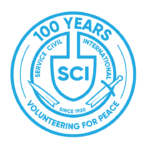Conflict is the Stuff of Life
This section will introduce you to some of the basic concepts of non-violent conflict resolution. Being aware of these possibilities will help you play your part in making your workcamp experience a path to peace.
Have you ever had a conflict and wished you could have handled it better?
We all have differences – in needs, values and motivations. Sometimes these differences will complement each other, but sometimes they will conflict. Conflict is not a problem in itself – it is what we do with it that counts. Taking positive action to resolve a conflict is important, because whether we like it or not, conflicts will demand our attention. In fact, an unresolved conflict can call on tremendous amounts of our attention. We all know how exhausting an ongoing conflict can be. It is not always easy to fix the problem but a great energy boost can come when we do. Being able to resolve conflict is not dependent on being a ‘nice’ person, rather it is a skill we can develop.
What are Conflict Resolution Skills?
Conflict resolution skills allow us to find ways of bypassing difficult personal differences so we can open up new possibilities of relating to others. Rather than polarising people, using the skills of conflict resolution can draw people closer together as they attempt to balance needs and search for fair solutions. This can create a beneficial shift in the way we interact – instead of seeing each other as adversaries, we can become co-operative partners.
Often we are quite unaware of the way we argue. We may most often use knee-jerk reactions to operates within difficult situations. When challenged, we experience separateness, disconnectedness from those around us – a feeling of “you versus me” – a sense that there isn’t enough for both of us and that if one person is right, then the other person must be wrong. Often we haven’t taken even a moment to consider what is the best approach in the circumstances. One of the first steps to reacting more positively to conflict is to understand that there are often many different levels to such situations.
In the following sections we will discuss the components of conflict, responses to conflict and some methods of conflict resolution.

